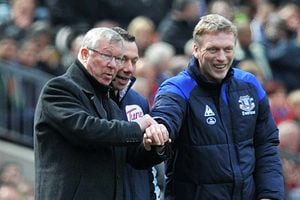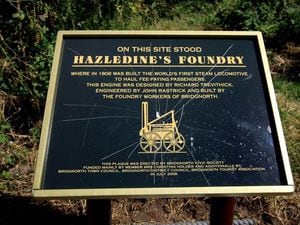David Moyes: From Shrews to Manchester United?
Should Everton boss David Moyes be named as the successor to Sir Alex Ferguson at Old Trafford today, it will surely be the highlight so far in the former Shrewsbury Town man's burgeoning managerial career, writes Matthew Viney.

But Moyes, who played almost 100 games for Town between 1987-1990, could have been part of the Old Trafford management team a long time ago if things had gone differently.
He had the chance to become Sir Alex Ferguson's assistant at Manchester United 15 years ago but missed out, he believes because his fellow Glaswegian found him "too intense".
Certainly, Ferguson kept tabs on the up-and-coming Preston North End manager and soon became a keen fan of a man who achieved remarkable success on extremely limited resources at Everton.
Born in Glasgow, Moyes had realised early on that his forte was going to be in management. At the age of 22 he was already taking coaching courses in preparation for the day when he would hang up his boots.
Former Shrewsbury Town alumni Jake King recalls helping David Moyes launch his coaching career during his playing days at the Gay Meadow.
Fellow Scot Moyes was looking for work to supplement his wages and was recommended by King for the post at Concord College in Acton Burnell near Shrewsbury back in 1987.
After a solid playing career he took his first managerial job as player-manager at Preston North End as the team reached the Division Two play-offs in his first full season at the helm.
And in his second North End won the title, and a year after that were in the Division One play-off final.
That swift transformation caught the eye of Everton, and it was to Moyes the Merseysiders turned in March 2002 after Walter Smith was sacked.
It was at Goodison Park this heir apparent to Ferguson really caught the eye – and increasingly to resemble his mentor at Old Trafford. His often ferocious demeanour, his inability to suffer fools gladly and his talent all parallels with the great Sir Alex.
Talent-spotting and his ability to prise the best out of his players, whatever their natural gifts, marked him down long ago as a potential successor.
His first full season saw Everton finish seventh, a remarkable achievement that earned him the first of three League Managers' Association manager-of-the-year awards.
Moyes also showed he had bravery – it was he who decided to unleash a 16-year-old Wayne Rooney on to the Premier League.
It was also Moyes who showed that Everton could survive and even flourish without their star player – for the first season without Rooney, 2004-5, was the one they finished highest: fourth place and another LMA award for Moyes.
In 2009, Everton were beaten FA Cup finalists – having beaten United in the semi-final – finished fifth in the league to secure a fourth European qualification in five seasons and Moyes picked up a third manager-of-the-year award.
To many it seemed just a question of when rather than if that those piercing blue eyes would be occupying the manager's dug-out at Old Trafford. Now, it appears, that time has finally come.
There are other parallels too between him and Ferguson. He may not have as big a reputation for combustion as Ferguson, but he is more than capable of standing his ground and is clearly a man of principle and honour. He has also survived and thrived at one club for a long time, having been with Everton for over a decade, putting him third in the list of the Premier League's longest-serving managers.
Moyes has remained loyal to Everton throughout and would only be leaving at the end of his contract.
Unlike Sir Alex Moyes has made little impact on the Champions League but he has experience in the competition.
In 2005 Everton qualified for the Champions League but were beaten by Villarreal in qualifying and were then thumped by Dinamo Bucharest when trying to downgrade to the UEFA Cup.
With so many league titles to their name, the Champions League is a higher priority at United than it may be at other clubs, and Moyes has no experience of pitting his wits against the likes of Pep Guardiola and Klopp. That does not mean he is not up to it, though, and time may well prove that he is.
Moyes also has a similar transfer record to Ferguson, with a largely successful record with the odd rogue player thrown in, with Moyes' work perhaps more admirable owing to the constraints he has worked under.
His capture of Tim Cahill for £2 million and the Australian's rise into one of the Premier League's all-time great goalscoring midfielders rates highly, as does his shrewd acquisition of Manchester United outcast Tim Howard.
He smartly invested in Leighton Baines and Phil Jagielka too, meaning the not-so-good buys – the likes of Andy van der Meydes and Nuno Valentes – during his reign can be quickly skipped over.
While few would argue Moyes has worked wonders on slim budgets, a scant return of one final in 11 years is not a glittering statistic.
Everton reached the 2009 FA Cup final and were beaten by Chelsea. But for a defensive switch-off against Liverpool in 2012 they would have reached the final again.
Just the one showpiece is the bottom line, though, with Moyes trading largely on respect for the stable and efficient job he has done at Goodison Park. Should he become the new manager at Old Trafford though that will surely change.





